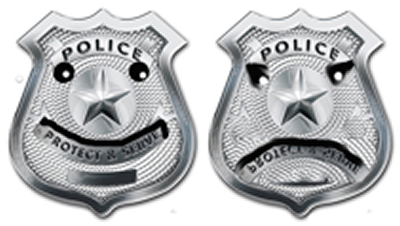
Since (and before) Michael Brown was gunned down by officer Wilson in Ferguson, Missouri and subsequent uses of police deadly force such that a black person is killed by police approximately every 18 hours in America, there has been a lot of discussion, protest, and other concern about policing in this country. “Protect and Serve” is the motto inscribed on any police vehicles that, after watching video after video of unarmed men being gunned down, an unarmed man being strangled to death in broad daylight, and a young Black girl slammed to the ground by a policemen who then kneels on her back, seems more a cynical joke than reassuring pledge.
Everything in America these days is parsed through its opposing political factions and its media are almost immediately saturated with a expected counter narrative. “Most cops are good cops,” “It’s just bad few bad apples,” are almost knee-jerk mantra by the right-wing media. “It’s a dangerous job” supposedly assures us that we, the public, just can’t quite appreciate the strain that seems to so frequently result in the officer imagining his victim was “reaching for a weapon.” You need to appreciate that, you see, that the cop is a victim, too.
Yes, I know, “it’s complicated.” (And, if it isn’t, it’s easy to make complicated). And, of course, it is the “complications,” what “the video didn’t show” that is the exculpatory fodder. I agree, the maelstrom of America’s racial sickness, the poverty, the drugs, domestic violence, the fucked-up system of jurisprudence, and its penal system, the gun culture, the militarization and self-protecting esprit de corps of the police, and the media’s love it all, make it complicated—so complicated that you might be made not to believe your own eyes when they view those videos, and believe the “unseen Rashoman reality” of it all. Never mind that under no logical circumstances is it proper, or moral, too gun down a fleeing unarmed man and shoot him to death. That it can be complicated, does not always mean that it is.
Although my personal experiences with law-enforcement have been minimal, and largely uneventful,* I have had some engagement with it in a professional capacity. In the 1970s, for extra money, I taught a couple of courses on government to police officers and sheriffs deputies (our School offered a bachelors in Criminal Justice Administration). It was at an off campus site and in the evening and some of the men (they were all male) showed up in full gear, guns, batons, etc. It was a two hour and forty minute class and we took a fifteen minute break in the middle. During on of these breaks early in the semester a Sheriff’s deputy casually inquired if the green Ford station wagon parked outside was mine. When I said that it was he said, “the one with . . ?” and then recited my license plate number.
As it happened this was the guy with whom I had had a little go-around with the previous week when I had countered some mis-impressions he had about what kinds of people are recipients of welfare (he had a Reagan-esque perspective) with some data from the Dept. Health, Education and Welfare. He must not have taken well being “schooled” on the subject (isn’t that what he was presumably there for?); so he decided to—as he smirkingly implied—“run my plates.” It was a classic intimidation ploy. I don’t know what possessed me, or even how the idea had come to me, but it raise some smiles on some of the officers standing around who had heard the exchange, when I replied, leaning forward for a better look,“ and I make note of the fact that your badge number is . . ,” and read it aloud. Needless to say, I didn’t want t be driving anywhere in this guy’s beat.
Some years later (4 January 1991) I developed and wrote a documentary for my program, Metropolitan Journal, that was broadcast on KPBS-FM, San Diego’s Public Broadcasting station. The program is pretty self-explanatory, and needs no elaboration here other than to remark that, nearly 25 years later, many of the concerns about the relationship between local police forces and their communities remain much the same.
___________________________________
© 2015, James A. Clapp (UrbisMedia Ltd. Pub. 6.18.2015)
